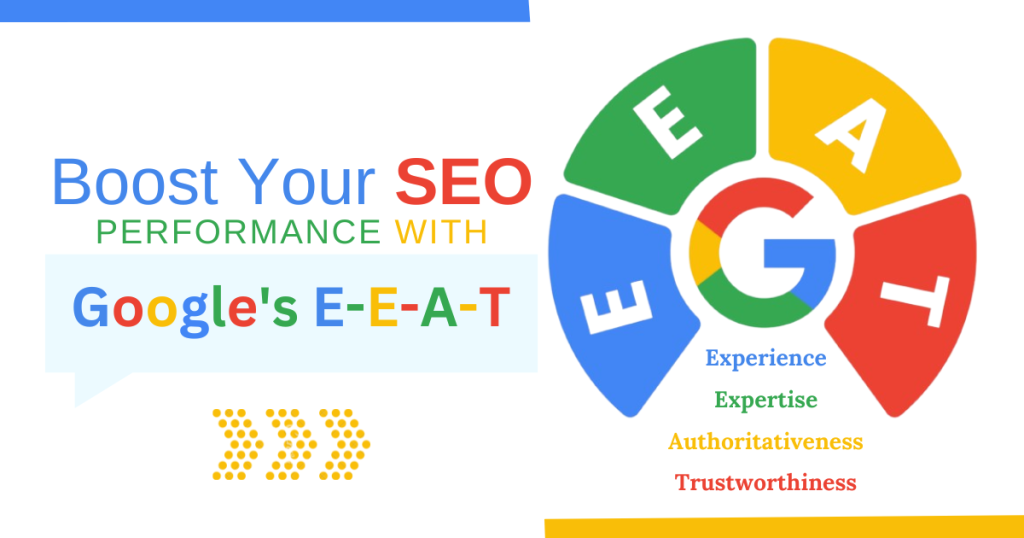Have you ever noticed why some websites always appear higher in search results? Google’s ranking algorithm considers EEAT as an important factor because of its complex structure.
As the industry leader in the search game, Google updates its algorithms frequently to give priority to user demands for specific types of content. Understanding and implementing these updates is key to maximizing your website’s organic reach and engagement.
One of Google’s core evaluation factors, often referred to as “EEAT,” stands for Experience, Expertise, Authoritativeness, and Trustworthiness. This framework helps Google assess the quality and credibility of your website and its content, ultimately influencing your ranking in search results.
Why is EEAT crucial for SEO?
Standing out in digital marketing is more critical than ever, and for businesses in the USA, robust SEO insights and services are essential. But what drives successful SEO? EEAT (Expertise, Authoritativeness, and Trustworthiness) plays a pivotal role.
Google prioritizes reliable information, particularly for YMYL (Your Money or Your Life) topics. By demonstrating EEAT, you showcase your brand’s expertise and trustworthiness, leading to higher rankings and increased visibility in searches.
Expert SEO services can help you establish your EEAT through content creation, website development, and reputation management. Invest in your online presence and unlock the potential of powerful SEO strategies.
Why Google Emphasized “Experience”
In recent years, Google has placed a growing emphasis on the “Experience” aspect of E-A-T. This shift reflects the search engine’s increasing focus on delivering users with the most relevant and reliable information, especially for topics related to Your Money or Your Life (YMYL) categories, such as health, finance, and legal matters.
By prioritizing websites with demonstrably experienced professionals, Google aims to ensure that users encounter well-informed content from trustworthy sources. This shift holds immense significance for websites and creators in the YMYL industry, requiring them to showcase their expertise and experience even more effectively.
How can you optimize your website for EEAT?
Here are some practical tips and tricks to enhance your website’s EEAT and boost your SEO performance:
Expertise:
Demonstrates the knowledge and experience of the content creator and the website in its niche.
- Create high-quality content: This forms the cornerstone of establishing expertise. Focus on in-depth, informative content that addresses user needs comprehensively. Conduct thorough research, cite reliable sources, and ensure factual accuracy.
- Showcase your knowledge and experience: Publish content written by subject matter experts (SMEs) within your field. Include their credentials and biographies to establish their expertise.
- Highlight industry recognition: If your website or individuals associated with it have received awards or industry recognition, showcase them prominently. This demonstrates expertise and adds credibility.
Authoritativeness:
Establishes the website’s position as a reliable source of information within the industry.
- Build backlinks from high-quality websites: Earning backlinks from reputable websites within your niche signifies that your content is valuable and trustworthy. Encourage guest blogging opportunities on relevant sites, or collaborate with other thought leaders in your industry.
- Maintain a clean and professional website design: A well-designed website with clear navigation and a user-friendly interface demonstrates your commitment to providing a positive user experience.
- Optimize your website for mobile devices: With most web searches now conducted on mobile devices, ensuring your website is responsive and provides an optimal mobile experience is crucial. So read here for some easy and quick mobile SEO tips to optimize.
Trustworthiness:
Builds confidence in the website’s content and its intentions towards the user.
- Transparency is key: Clearly state your website’s purpose and the team behind it. Include an “About Us” page with detailed information about your company, team members, and their qualifications.
- Prioritize user privacy: Implement robust data security measures and have a clear privacy policy outlining how you collect and handle user data.
- Encourage user reviews and testimonials: Positive feedback from satisfied users adds social proof and builds trust in your brand. Implement a system to collect and display genuine user reviews.
- Maintain consistent branding: Use a consistent tone and style across all your website content and communication channels. This establishes a recognizable brand identity and fosters trust.
Additional tips to remember:
- Focus on providing value: Always prioritize user intent and create content that truly addresses your audience’s needs and pain points.
- Be transparent about paid content: If you have any sponsored content or advertisements on your website, clearly label them as such.
- Stay updated: Regularly update your content to reflect the latest information and industry trends. This demonstrates your commitment to providing fresh and accurate content.
Remember, building EEAT is an ongoing process. By consistently creating valuable content, establishing your authority, and earning trust, you can significantly improve your website’s SEO performance and attract more organic traffic.
Beyond these tips:
E-E-A-T plays a significant role in SEO, it’s crucial to remember that it’s just one factor among many. Focus on other SEO best practices like keyword research, backlink strategy, on-page optimization, and technical SEO to achieve a holistic approach.
Furthermore, it’s important to avoid black-hat SEO tactics that aim to manipulate search engines rather than providing genuine value to users. Google actively penalizes websites that engage in such practices, ultimately harming their ranking and online reputation.
While this blog post provides a foundational guide, it’s important to remember that EEAT is a complex concept and Google’s guidelines are constantly changing. Staying informed through reputable sources like Google’s Search Quality Raters Guidelines and industry blogs can help you stay ahead of the curve and ensure your website remains aligned with Google’s evolving standards.
By consistently implementing these strategies and staying informed about the latest SEO trends, you can effectively leverage Google’s EEAT framework to achieve remarkable results for your website’s search engine ranking and, ultimately, reach your target audience effectively.

